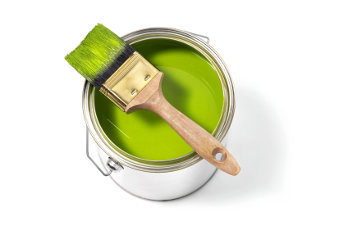Paint
Last Updated: 10/16/24
Reprocessed paint is postconsumer latex paint that has been sorted by a variety of characteristics including type (i.e., interior or exterior), light and dark colors, and finish (e.g., high-gloss or flat). Reprocessed paint is available in various colors and is suitable for both interior and exterior applications.
 Product Details
Product Details
To the maximum extent practicable, federal agencies are required to buy sustainable products, which are products that meet the purchasing program(s) listed below.
If there is more than one program listed below, agencies are directed to prioritize multi-attribute products, which meet statutory purchasing program requirements (![]() ) and one or more required Environmental Protection Agency purchasing programs.
) and one or more required Environmental Protection Agency purchasing programs.
Review our frequently asked questions for more information.
|
Product Type
|
Procurement Info
|
Where to Buy
|
|---|---|---|
| Consolidated Latex Paint |
|
|
| Reprocessed Latex Paint -- Dark Colors |
|
|
| Reprocessed Latex Paint -- White, Off-White, and Pastel Colors |
|
|
| Interior Paints and Coatings -- Latex |
|
|
| Interior Paints and Coatings -- Water-borne Alkyd |
|
|
| Interior Paints and Coatings -- Oil-Based |
|
|
| Interior Paints and Coatings -- Solvent-borne Alkyd |
|
|
| Exterior Paint and Coatings |
|
 Legal Requirements
Lists federal requirements related to the purchase of this item, including applicable Federal Acquisition Regulation (FAR) requirements
Legal Requirements
Lists federal requirements related to the purchase of this item, including applicable Federal Acquisition Regulation (FAR) requirements
 Life Cycle Cost Savings
Life Cycle Cost Savings
Life Cycle Costing (LCC) aims to quantify the financial impact of a product over its entire life cycle to assist consumers in making decisions that will save them money over the long term.
NIST’s BEES Online v2.0![]() offers detailed environmental lifecycle analyses. Life cycle costing is available as an option. It is recommended that users have some experience with life cycle analysis in order to answer the tool’s questions.
offers detailed environmental lifecycle analyses. Life cycle costing is available as an option. It is recommended that users have some experience with life cycle analysis in order to answer the tool’s questions.
 Guiding Principles
Guiding Principles
Contributes to meeting The Guiding Principles for Sustainable Federal Buildings
 Additional Guidance
Additional Guidance
For paint, particularly if the building is located in an air non-attainment area or if there are concerns about indoor air quality, look for paints with no or low levels of volatile organic compounds (VOCs).
Federal Programs
Some types of paints are also covered by EPA's Significant New Alternatives Policy (SNAP) program![]() , which identifies acceptable substitutes for ozone-depleting substances in products.
, which identifies acceptable substitutes for ozone-depleting substances in products.
According to BioPreferred, interior paints and coatings are pigmented liquids, formulated for use indoors, that dry to form a film and provide protection and added color to the objects or surfaces to which they are applied. BioPreferred maintains an electronic product catalog![]() listing products that either (1) are eligible for preferred federal procurement, or (2) have earned the USDA Certified Biobased Product Label.
listing products that either (1) are eligible for preferred federal procurement, or (2) have earned the USDA Certified Biobased Product Label.
Guiding Principles for Sustainable Federal Buildings
The applicable Guiding Principle for High Performance and Sustainable Buildings depends on what characteristics are included in the product. If it has recycled or biobased content it would be GP 5, if it is low-emitting it would be GP 4, if it's both, it would be included in both. "Low emitting" would be any product that has a low emissions or low VOC standard.
Indoor Air Quality/VOC Emissions
Review the California Department of Public Health (CDPH) Standard Method for the Testing and Evaluation of Volatile Organic Chemical Emissions from Indoor Sources Using Environmental Chambers, Version 1.1-2010. (This is the VOC emission testing method for California Specification 01350.


 CPG
CPG
.jpg) USDA BioPreferred® Program
USDA BioPreferred® Program
 Cradle to Cradle Certified (C2C)
Cradle to Cradle Certified (C2C)
 Eco Choice Aotearoa (formerly Environmental Choice New Zealand): Paints
Eco Choice Aotearoa (formerly Environmental Choice New Zealand): Paints
 Green Seal 11
Green Seal 11
 MPI Extreme Green
MPI Extreme Green
 SCS Indoor Advantage Gold
SCS Indoor Advantage Gold
 Ecologo/UL 2818 GREENGUARD Certification
Ecologo/UL 2818 GREENGUARD Certification
 Intertek Clean Air Gold Certification
Intertek Clean Air Gold Certification
 MAS Certified Green
MAS Certified Green